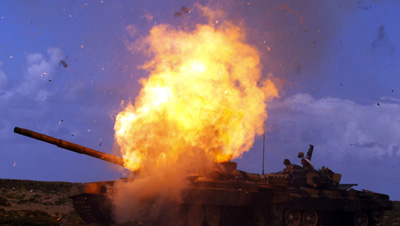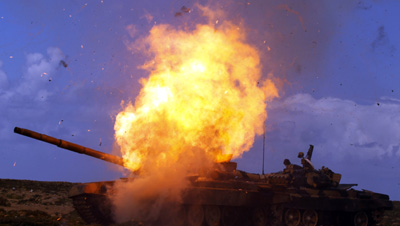News from the Committee to Protect Journalists, March 2011

Deadly and dangerous in the Middle East
With more than 300 attacks on the media, ranging from detentions, obstruction of coverage, and threats to disappearances and killings, the wave of unrest sweeping across the Middle East has turned into an increasingly challenging story for local and foreign journalists. As Executive Director Joel Simon recently told the Financial Times, “These governments that are struggling to survive see control of information as an essential part of maintaining their regime.”
The unrest has brought with it the killing of five journalists across the region. Detentions have sometimes been accompanied by torture, as in the case of BBC reporters and the New York Times journalists taken into custody by government forces in Libya, where there have been more than 60 attacks on media. You can see a running tally of Libyan press violations on the CPJ Blog. At least 10 journalists remain missing or detained in the country.
In an attempt to look ahead, the Al-Jazeera Forum, an annual gathering of civil society, academia, and business, debated the media’s role and the dangers it faces along with many other issues related to the future of the region. CPJ’s Abdel Dayem spoke about the state of press freedom in the region and the means used to suppress information.
The anti-revolution censors
While governments in the Middle East respond to demands for reform by silencing the press, elsewhere, authorities engage in preventive actions in an attempt to keep dissent at bay. Feeling insecure, the Cameroonian government decided to suspend Twitter. The government’s request, announced by an executive from a local telecommunications provider, echoes moves before the revolution in Egypt, where not only did the government unplug the Internet, but also ordered companies to cut off mobile phone service during protests and send mass text messages on its behalf.
Even a mention can cause trouble. A state radio presenter’s reference to Libya during a live radio program led censors to abruptly force the journalist off the air and order an indefinite suspension from Equatorial Guinea’s tightly monitored national airwaves. The country is among several in Sub-Saharan Africa that has imposed a blackout on news of the uprisings, CPJ research shows. Equatorial Guinea’s president, who is also chairman of the African Union–which is responsible for protecting human rights including press freedom–recently called on legal reforms to protect the rights of citizens.
In Zimbabwe, authorities arrested 46 lawyers, students, and trade unionists, for watching news clips of the revolutionary demonstrations in Egypt, accusing them of plotting to overthrow the regime through mass uprisings.
China has kept up with this trend by restricting, detaining, and harassing foreign journalists while also censoring coverage of what has become known as the “Jasmine Revolution.” CPJ called these levels of media repression higher than anything seen since the 2008 Olympics. A recent CNN appearance by CPJ Deputy Director Robert Mahoney went off the air after a couple seconds in China. He was talking, of course, about Beijing’s crackdown on foreign journalists.
A victorious moment for Cuban journalists
As CPJ’s Carlos Lauría writes on the CPJ Blog, this year’s anniversary of Cuba’s Black Spring, when 29 journalists were jailed in a brutal crackdown by the government in 2003, was finally joyful: Following eight years of appeals coupled with diplomatic and public pressure, all of the journalists have been freed.
Héctor Maseda Gutiérrez, the last journalist to be released, writes about his ordeal and newfound freedom, accompanied by an entry from his wife, whose reunification with her husband conveys the enduring power of love and her belief in social justice.
The blog entries are part of an ongoing series of first-person stories about prison hardships and new freedom.
CPJ at 30: Celebrating in the spirit of debate
CPJ kicked off what is slated to be a series of events marking its founding in 1981, with a quest to examine changes in war reporting and the defense of today’s digital frontlines, both vital issues for press freedom.
The two panel discussions held on March 4 at New York’s Columbia University featured leading journalists on the challenges and victories for press freedom. Videos of the expert panels, moderated by veteran journalist and CPJ board member Dan Rather and Chairman and Editor-in-Chief of the Slate Group Jacob Weisberg, are available on the CPJ website.
Upcoming events
On April 1, April Fools’ Day in the United States, journalists will be laughing at and amongst themselves as the National Press Club hosts its third annual charity extravaganza, “Commedia dell Media,” where 12 competitors have lined up to vie for the title of D.C.’s funniest journalist. The event will benefit CPJ’s Journalist Assistance Fund and other groups. Click here for details.
Donate
CPJ’s Distress Fund provides emergency grants to journalists facing persecution for their work. Support our work and make a donation online today.
Best of the CPJ Blog
U.N. to investigate Sri Lankan journalist’s disappearance
Michael Anti’s exile from Facebook over ‘real-name policy’
